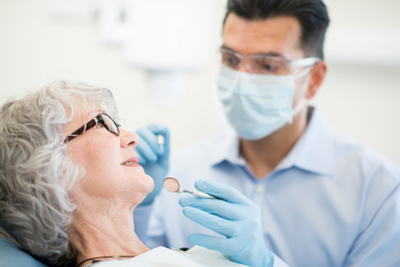ORAL CANCER SURGERY
Cancers of the head and neck are diagnosed in thousands of American adults each year. While this cancer is often treatable in its early stages, the mortality rates are high, because the cancer is often not detected until it’s in its later stages.
RISK FACTORS FOR ORAL CANCER
Head and neck cancers are more common in those who use any form of tobacco. That includes not only smoking any form of tobacco (cigarettes, cigars, or pipes), but also using snuff, chewing, or using smokeless tobacco. The use of alcohol, particularly when combined with tobacco use, can also raise the risk. Other risk factors for oral cancer include infection with human papillomavirus (HPV), a common sexually transmitted virus that may have no symptoms, and chronic sun exposure on the face.

If you have any of these risk factors, then it’s important to perform a monthly self-exam to check for possible early signs of oral cancer. Even if you have none of the risk factors, you could still develop one of these cancers, and because the self-exam process is simple and takes only a minute or two, it’s recommended that everyone perform a monthly self-exam.
Using a bright flashlight, look at the inside of your mouth, including inside your lips, on the roof of your mouth, all sides of your tongue, and in the back of your throat. Look for any unusual lumps or patches, or a sore that doesn’t heal. Using your fingers, feel along all of these tissues for unusual lumps, and feel along your neck for any lumps that don’t resolve. If you find anything, go to your doctor to have it checked out; you may be referred to an oral and maxillofacial surgeon for a biopsy to check for oral cancer.
TREATMENT OF HEAD AND NECK CANCER
The treatment for cancers of the head and neck usually involves removing the tumor. Because the head and neck contain so many important structures, the removal of a tumor may involve intricate surgery to protect as much of the normal tissue as possible. In many cases, reconstruction is also needed later. Adequate anesthesia, whether local or general, is used during oral cancer surgery. Sometimes, other treatments, such as chemotherapy or radiation, are also used; an oncologist will supervise these treatments.
An oral and maxillofacial surgeon is a specialist in these surgeries. While patients are understandably anxious when their cancer is diagnosed, surgeons are often able to preserve much of the patient’s normal tissue and to perform reconstructive surgery when necessary. The chances of a good outcome increase if oral cancer is diagnosed early, and oral cancer surgery is performed while the cancer is still small and hasn’t spread.
ORAL SURGEON IN AUSTIN
If you may require oral cancer surgery in Austin, then you’ll need to consult with qualified head and neck surgeon to determine what your next steps will be. Dr. Derrick Flint is an oral surgeon in Austin with specialized training and years of experience. He knows that patients often feel anxious and worried when they receive a definite or possible cancer diagnosis, and he does his best to put patients at ease and to help answer all of their questions. Often, oral cancer surgery requires a team approach with surgeons specializing in removal of the tumor and reconstruction, oncologist and radiologist. To book a consultation with Dr. Flint, please call our office.
More Dental Services
3D Imaging
Facial Trauma Surgery
Oral Cancer Surgery
Single Tooth Dental Implants
Anesthesia
Full Arch Replacement with Dental Implants
Oral Pathology
Sleep Apnea Treatment
Bone Graft
Impacted Canine
Implant Anchored Dentures
Pre-Prosthetic Surgery
TMJ Treatment
Cleft Lip and Palate
Impacted Wisdom Teeth
Jaw Surgery
Ridge Augmentation
Tooth Extraction

